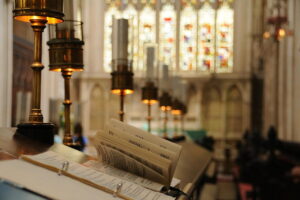Acts 2: 14, 22-33 (RM) or 2: 14a, 36-41(RCL); Psalm 16; 1 Peter 1: 17-21 (RM) or 17-23 (RCL); Luke 24: 13-35.
“Christ is risen, Alleluia!”
“Just as the women said! Alleluia!”
If you haven’t heard, this is the new version of the traditional call-and-response Easter shout exchanged with great joy among members of the Eastern churches, Orthodox and Greek Catholic alike:
“Christ is risen! He is risen indeed!”
Our Gospel story today, of the journey to Emmaus, illustrates that the word did not get around right away. The opening scene shows two of Jesus’ friends, a man named Cleopas and an unnamed person whom some modern scholars suggest may have been his wife, therefore an unnamed woman. They were walking the seven miles or so from Jerusalem to a town not on the map today that Luke calls Emmaus.
The disappointment weighs heavily upon them, crushing their spirits. “We used to hope…” is how they spoke to the stranger walking beside them of their deep pain and loss that Jesus of Nazareth, who had seemed a great prophet and miraculous healer, had been executed. “We had hoped he would be the one to redeem Israel,” not in a later theological sense, but as a conquering hero vanquishing Israel’s enemies. They seem not to have been cautious for their own safety. They spoke freely, apparently not afraid the stranger was a spy for the Roman forces.
They had heard the report of the empty tomb before leaving Jerusalem, but thought nothing of it. Luke records in 24: 4-11 that Mary of Magdala, Joanna, Mary the mother of James and the other unnamed women with them told the apostles they had found the tomb empty, and men in dazzling clothes who announced that Jesus had risen, just as he had told them while in Galilee. But to the eleven men:
“these words seemed to them an idle tale, and they did not believe them.”
Granted this was extraordinary news. But, an idle tale, told by women? Seriously? How… patronizing.
I shouldn’t admit it, but this puts me in mind of a very old comedy sketch. Several country women are standing around a big laundry tub, bobbing back and forth, vigourously scrubbing their wet clothes against ribbed washboards, and singing,
“Oh you’ll never hear one of us repeatin’ gossip. So you better be sure an’ listen close the first time.”
When you can’t believe your eyes, or your ears, you tend to assume you’ve got it wrong. And there’s some logic in this initial reaction. It’s a form of denial. Oh no, it couldn’t have happened like this. It’s unnatural. It’s in-credible.
Just an idle tale. Just them silly ol’ women repeatin’ gossip.
And part of the wonderful irony in the way Luke tells this story is that the two friends of Jesus still don’t get it, even when the stranger goes through the Scriptures they know well and points out all the foreshadowings that indicate that this Jesus was indeed the Messiah they had hoped for. A different sort of Messiah, but still.
They heard it all, still didn’t put the pieces together, and more to the point, didn’t visually recognize the identity of the stranger. Luke wrote for people who knew of other stories in the ancient world where angels appear in guise to humans, like the angels in the tomb. Or divine figures appear in ways that are not immediately recognizable. And when does it all come together? At table, when the stranger blessed and broke the bread.
Luke’s people would have gotten this right away. A service of reading and explaining the Word, followed by a breaking of the Bread. And what followed after that? Mission. Although it was getting dark the two scurried back to the city to find the other friends of Jesus to tell what they had seen and heard, inexplicable as it was. They became missionaries of the risen, cosmic, Christ. Cosmic. Risen.
Just as the women said. Alleluia.
© Susan K. Roll
Susan Roll retired from the Faculty of Theology at Saint Paul University, Ottawa, in 2018, where she served as Director of the Sophia Research Centre. Her research and publications are centred in the fields of liturgy, sacraments, and feminist theology. She holds a Ph.D. from the Catholic University of Leuven (Louvain), Belgium, and has been involved with international academic societies in liturgy and theology, as well as university chaplaincy, Indigenous ministry and church reform projects.





I love the photo that heads this reflection!
Easter stories of biblical women talking and not being believed reminds me of a movie I saw recently. “Women Talking” is an account of the liberating effect of women honestly sharing to resolve a critical life-situation. In both scripture and film, the women’s words “seemed to them an idle tale, and they did not believe them.”
But their words were true.
And I am immediately adopting the practice of affirming Jesus resurrection: “Just as the women said! Alleluia!”